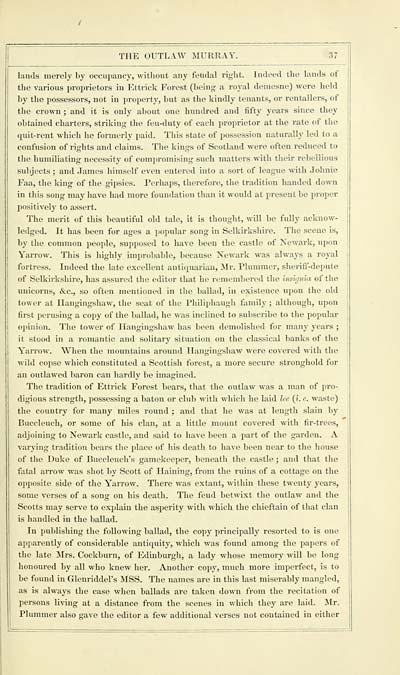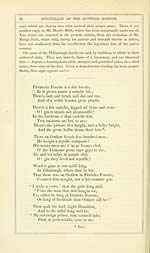Download files
Complete book:
Individual page:
Thumbnail gallery: Grid view | List view

THE OUTLAW MURRAY.
lands merely by occupancy, without any feudal right. Indeed the lands of
the various proprietors in Ettrick Forest (being a royal demesne) were held
by the possessors, not in property, but as the kindly tenants, or rentallers, of
the crown ; and it is only about one hundred and fifty years since they
obtained charters, striking the feu-duty of each proprietor at the rate of the
quit-rent which he formerly paid. This state of possession naturally led to a
confusion of rights and claims. The kings of Scotland were often reduced to
the humiliating necessity of compromising such matters with their rebellious
subjects ; and James himself even entered into a sort of league with Johnie
Faa, the king of the gipsies. Perhaps, therefore, the tradition handed down
in this song may have had more foundation than it would at present be proper
positively to assert.
The merit of this beautiful old tale, it is thought, will be fully acknow-
ledged. It has been for ages a popular song in Selkirkshire. The scene is,
by the common people, sujiposed to have been the castle of Newark, ujjon
Yarrow. This is highly improbable, because Newark was always a royal
fortress. Indeed the late excellent antiquarian, Mr. Plummer, sheriff-depute
of Selkirkshire, has assured the editor that he remembered the insujnia of the
unicorns, &c., so often mentioned in the ballad, in existence upon the old
tower at Ilangingshaw, the seat of the Philiphaugh family ; although, upon
first perusing a cojiy of the ballad, he was inclined to subscribe to the popular
ojjinion. The tower of Ilangingshaw has been demolished for many years ;
it stood in a romantic and solitary situation on the classical banks of the
Yarrow. When the mountains around Hangingshaw were covered with the
wild copse which constituted a Scottish forest, a more secure stronghold for
an outlawed baron can hardly be imagined.
The tradition of Ettrick Forest bears, that the outlaw was a man of pro-
digious strength, possessing a baton or club with which he laid lee (i. e. waste)
the country for many miles round ; and that he was at length slain by
Buccleuch, or some of his clan, at a little mount covered with fir-trees,
adjoining to Newark castle, and said to have been a part of the garden. A
varj-ing tradition bears the place of his death to have been near to the house
of the Duke of Buccleuch's gamekeeper, beneath the castle ; and that the
fatal aiTOw was shot by Scott of Haining, from the ruins of a cottage on the
opposite side of the Yarrow. There was extant, within these twenty years,
some verses of a song on his death. The feud betwixt the outlaw and the
Scotts may serve to explain the asperity with which the chieftain of that clan
is handled in the ballad.
In publishing the following ballad, the copy principally resorted to is one
apparently of considerable antiquity, which was found among the papers of
the late Mrs. Cockburn, of Edinburgh, a lady whose memory will be long |
honoured by all who knew her. Another cojiy, much more imperfect, is to
be found in Glenriddel's MSS. The names are in this last miserably mangled,
as is always the case when ballads are taken down from the recitation of
persons living at a distance from the scenes in which they are laid. Mr.
Plummer also gave the editor a few additional verses not contained in either
lands merely by occupancy, without any feudal right. Indeed the lands of
the various proprietors in Ettrick Forest (being a royal demesne) were held
by the possessors, not in property, but as the kindly tenants, or rentallers, of
the crown ; and it is only about one hundred and fifty years since they
obtained charters, striking the feu-duty of each proprietor at the rate of the
quit-rent which he formerly paid. This state of possession naturally led to a
confusion of rights and claims. The kings of Scotland were often reduced to
the humiliating necessity of compromising such matters with their rebellious
subjects ; and James himself even entered into a sort of league with Johnie
Faa, the king of the gipsies. Perhaps, therefore, the tradition handed down
in this song may have had more foundation than it would at present be proper
positively to assert.
The merit of this beautiful old tale, it is thought, will be fully acknow-
ledged. It has been for ages a popular song in Selkirkshire. The scene is,
by the common people, sujiposed to have been the castle of Newark, ujjon
Yarrow. This is highly improbable, because Newark was always a royal
fortress. Indeed the late excellent antiquarian, Mr. Plummer, sheriff-depute
of Selkirkshire, has assured the editor that he remembered the insujnia of the
unicorns, &c., so often mentioned in the ballad, in existence upon the old
tower at Ilangingshaw, the seat of the Philiphaugh family ; although, upon
first perusing a cojiy of the ballad, he was inclined to subscribe to the popular
ojjinion. The tower of Ilangingshaw has been demolished for many years ;
it stood in a romantic and solitary situation on the classical banks of the
Yarrow. When the mountains around Hangingshaw were covered with the
wild copse which constituted a Scottish forest, a more secure stronghold for
an outlawed baron can hardly be imagined.
The tradition of Ettrick Forest bears, that the outlaw was a man of pro-
digious strength, possessing a baton or club with which he laid lee (i. e. waste)
the country for many miles round ; and that he was at length slain by
Buccleuch, or some of his clan, at a little mount covered with fir-trees,
adjoining to Newark castle, and said to have been a part of the garden. A
varj-ing tradition bears the place of his death to have been near to the house
of the Duke of Buccleuch's gamekeeper, beneath the castle ; and that the
fatal aiTOw was shot by Scott of Haining, from the ruins of a cottage on the
opposite side of the Yarrow. There was extant, within these twenty years,
some verses of a song on his death. The feud betwixt the outlaw and the
Scotts may serve to explain the asperity with which the chieftain of that clan
is handled in the ballad.
In publishing the following ballad, the copy principally resorted to is one
apparently of considerable antiquity, which was found among the papers of
the late Mrs. Cockburn, of Edinburgh, a lady whose memory will be long |
honoured by all who knew her. Another cojiy, much more imperfect, is to
be found in Glenriddel's MSS. The names are in this last miserably mangled,
as is always the case when ballads are taken down from the recitation of
persons living at a distance from the scenes in which they are laid. Mr.
Plummer also gave the editor a few additional verses not contained in either
Set display mode to: Large image | Transcription
Images and transcriptions on this page, including medium image downloads, may be used under the Creative Commons Attribution 4.0 International Licence unless otherwise stated. ![]()
| Early Gaelic Book Collections > J. F. Campbell Collection > Minstrelsy of the Scottish border > (131) |
|---|
| Permanent URL | https://digital.nls.uk/80601997 |
|---|
| Description | Volumes from a collection of 610 books rich in Highland folklore, Ossianic literature and other Celtic subjects. Many of the books annotated by John Francis Campbell of Islay, who assembled the collection. |
|---|
| Description | Selected items from five 'Special and Named Printed Collections'. Includes books in Gaelic and other Celtic languages, works about the Gaels, their languages, literature, culture and history. |
|---|

